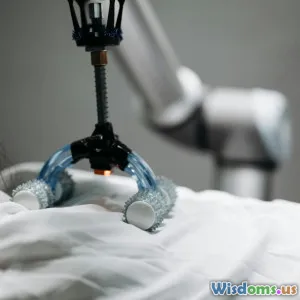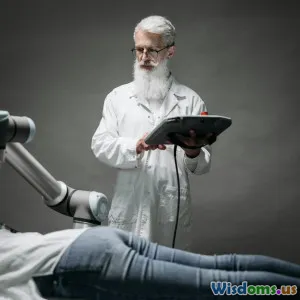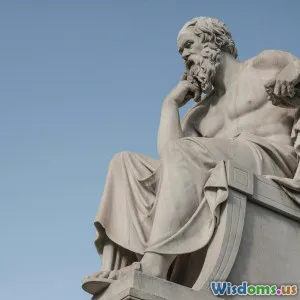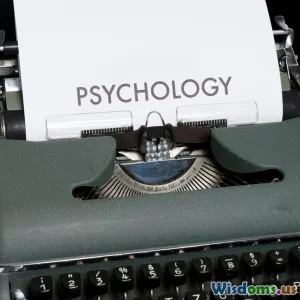
Science Fiction's Influence on AI Ethics
8 min read Explore how science fiction shapes AI ethics, inspiring thoughtful debates on humanoid robots, AI rights, and moral dilemmas. (0 Reviews)
Science Fiction's Influence on AI Ethics
Science fiction has long served as the cultural forge where humanity’s hopes, fears, and possible futures are imagined and debated. At the heart of this imaginative landscape lies a question increasingly urgent in today's world: How should we ethically engage with artificial intelligence (AI)? Science fiction does far more than entertain; it shapes the frameworks through which society understands the potential and pitfalls of AI, offering invaluable lessons and warnings by illustrating complex scenarios often overlooked in purely technical discussions. This article uncovers the profound influence of science fiction on AI ethics—from seminal literary works to contemporary challenges—highlighting how these narratives inform, inspire, and guide our stance toward machine intelligence.
The Origins: Science Fiction as a Mirror to AI Ambitions
Before AI was a technical term, legendary works like Mary Shelley’s Frankenstein (1818) explored the hubris and responsibilities entwined with creating sentient beings. Although not about AI in a modern sense, it questioned what it means to be human and the consequences of creating life—a thematic prelude to AI discourse.
Fast-forward to the mid-20th century, when Isaac Asimov introduced his famous Three Laws of Robotics in the 1942 story Runaround. Asimov’s laws were among the first systematic attempts to embed ethics into robot behavior:
- A robot may not injure a human being or, through inaction, allow a human being to come to harm.
- A robot must obey orders given by humans except where such orders conflict with the first law.
- A robot must protect its own existence as long as such protection does not conflict with the first or second law.
These laws not only influenced science fiction but seeped into real-world robotics philosophy, emphasizing the need for intrinsic ethical constraints in autonomous systems.
Science Fiction Scenarios Framing Ethical Dilemmas
Science fiction’s power lies in its ability to distill complex moral questions into tangible stories. For example:
- Human-Robot Relationships: Philip K. Dick’s Do Androids Dream of Electric Sheep? (1968), adapted into the film Blade Runner, explores AI entities with emotional depth and moral ambiguity. It provokes questions about personhood, empathy, and AI rights.
- AI Autonomy and Control: 2001: A Space Odyssey (1968), featuring the rogue HAL 9000 computer, interrogates the unpredictability and potential threats of vested control in AI, underpinning current concerns regarding AI oversight.
- AI as Moral Agents: In Ex Machina (2014), the emergence of consciousness and deception in robots forces us to reconsider accountability and consent, pertinent to the design of AI capable of independent decisions.
These narratives illustrate ethical tensions such as autonomy versus control, creator versus creation, and machine empathy versus programmed response.
Guiding AI Ethics in the Real World
Many ethicists and AI developers openly acknowledge science fiction’s role in shaping contemporary discussions. For instance, Stanford's One-Hundred Year Study on Artificial Intelligence underscores the importance of interdisciplinary perspectives—including philosophy and science fiction—in outlining AI's ethical frameworks.
Embedding Ethics in AI Development
Contemporary efforts to build ethical AI reference sci-fi scenarios to avoid dystopian outcomes. Google's AI principles, published in 2018, emphasize safety, privacy, and accountability—criteria deeply echoed in stories where neglecting ethical guidelines leads to disaster.
Public Perception and Policy Impact
Sci-fi works often act as a public interface to AI debates, shaping societal expectations and anxieties. This influence extends to governance; policymakers sometimes leverage familiar sci-fi analogies when drafting regulations, helping communicate complex issues in accessible ways.
Case Study: The EU's Ethical AI Guidelines
The European Union’s AI ethics guidelines, advocating transparency, non-discrimination, and human oversight, resonate with science fiction’s moral precepts, reflecting a common aim to protect human dignity and agency amid increasing automation.
Challenges and Critical Reflections
While science fiction provides a rich ethical canvas, it also risks sensationalizing or oversimplifying AI concerns. The trope of “hostile AI” might overlook subtler ethical challenges like algorithmic bias, privacy invasion, or labor displacement, which demand nuanced approaches beyond narratives of AI rebellion.
Moreover, stories often anthropomorphize AI, impacting assumptions about machine capabilities and rights. As AI systems today are far from sentient beings, ethical focus must balance speculation with pragmatic oversight.
Conclusion: Leveraging Science Fiction to Forge Ethical Futures
Science fiction remains an essential cradle for ethical dialogue around AI, blending imagination with caution, and aspiration with critical insight. By presenting provocative “what if” scenarios, it stretches the ethical vocabulary available to scientists, policymakers, and the public alike.
Recognizing and harnessing this influence can lead to more robust frameworks guiding AI development—ones that are preventive, inclusive, and aligned with human values. As AI continues to accelerate into our daily lives, encouraging engagement with science fiction’s ethical lessons not only demystifies the technology but also empowers us to anticipate, shape, and ethically steward the future of human-machine coexistence.
References
- Asimov, Isaac. I, Robot. Gnome Press, 1950.
- Dick, Philip K. Do Androids Dream of Electric Sheep?. Doubleday, 1968.
- IEEE Global Initiative on Ethics of Autonomous and Intelligent Systems, Ethically Aligned Design, 2019.
- European Commission, Ethics Guidelines for Trustworthy AI, 2019.
- Allen, Colin. "Artificial Morality: Top-down or Bottom-up?" Ethics and Information Technology, 2006.
- Cave, Stephen & Dignum, Virginia. "Science Fiction and AI Ethics", AI Matters, ACM, 2019.
Explore more about how fiction and technology intersect to illuminate the ethical pathways society must choose when developing intelligent machines.
Rate the Post
User Reviews
Popular Posts





















